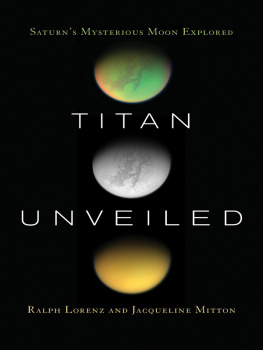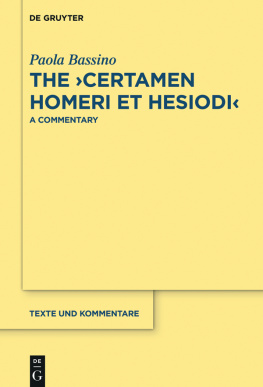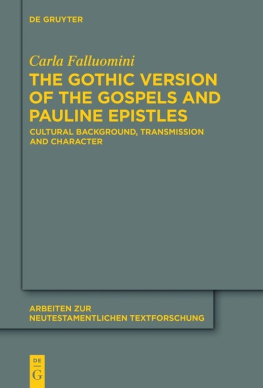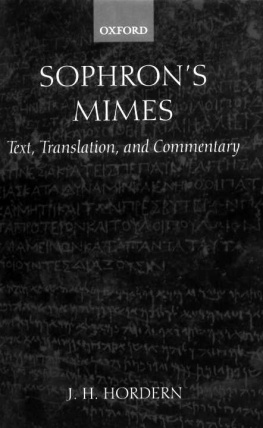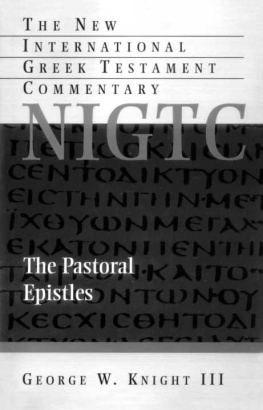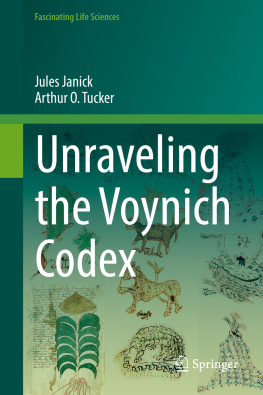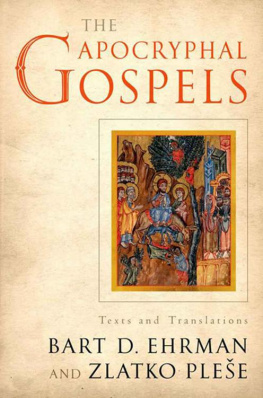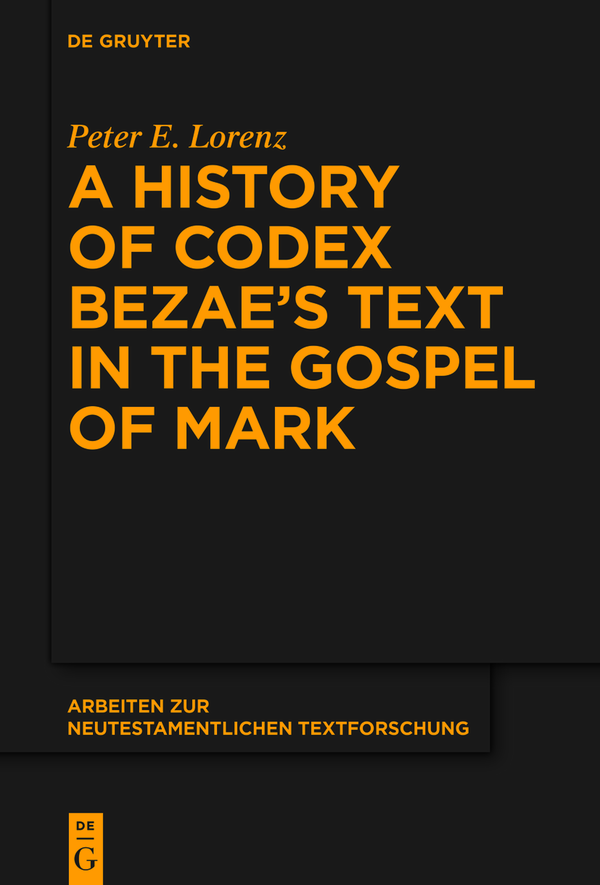Arbeiten zur neutestamentlichen Textforschung
Edited by
Institut fr neutestamentliche Textforschung
Holger Strutwolf
David C. Parker
Volume
ISBN 9783110746051
e-ISBN (PDF) 9783110746860
e-ISBN (EPUB) 9783110746938
Bibliographic information published by the Deutsche Nationalbibliothek
The Deutsche Nationalbibliothek lists this publication in the Deutsche Nationalbibliografie; detailed bibliographic data are available on the Internet at http://dnb.dnb.de.
2022 Walter de Gruyter GmbH, Berlin/Boston
Peter E. Lorenz
A History of Codex Bezaes Text in the Gospel of Mark
Arbeiten zur Neutestamentlichen Textforschung

Herausgegeben im Auftrag des Instituts fr Neutestamentliche Textforschung der Westflischen Wilhelms-Universitt Mnster/Westfalen
von David C. Parker und Holger Strutwolf
Band 53
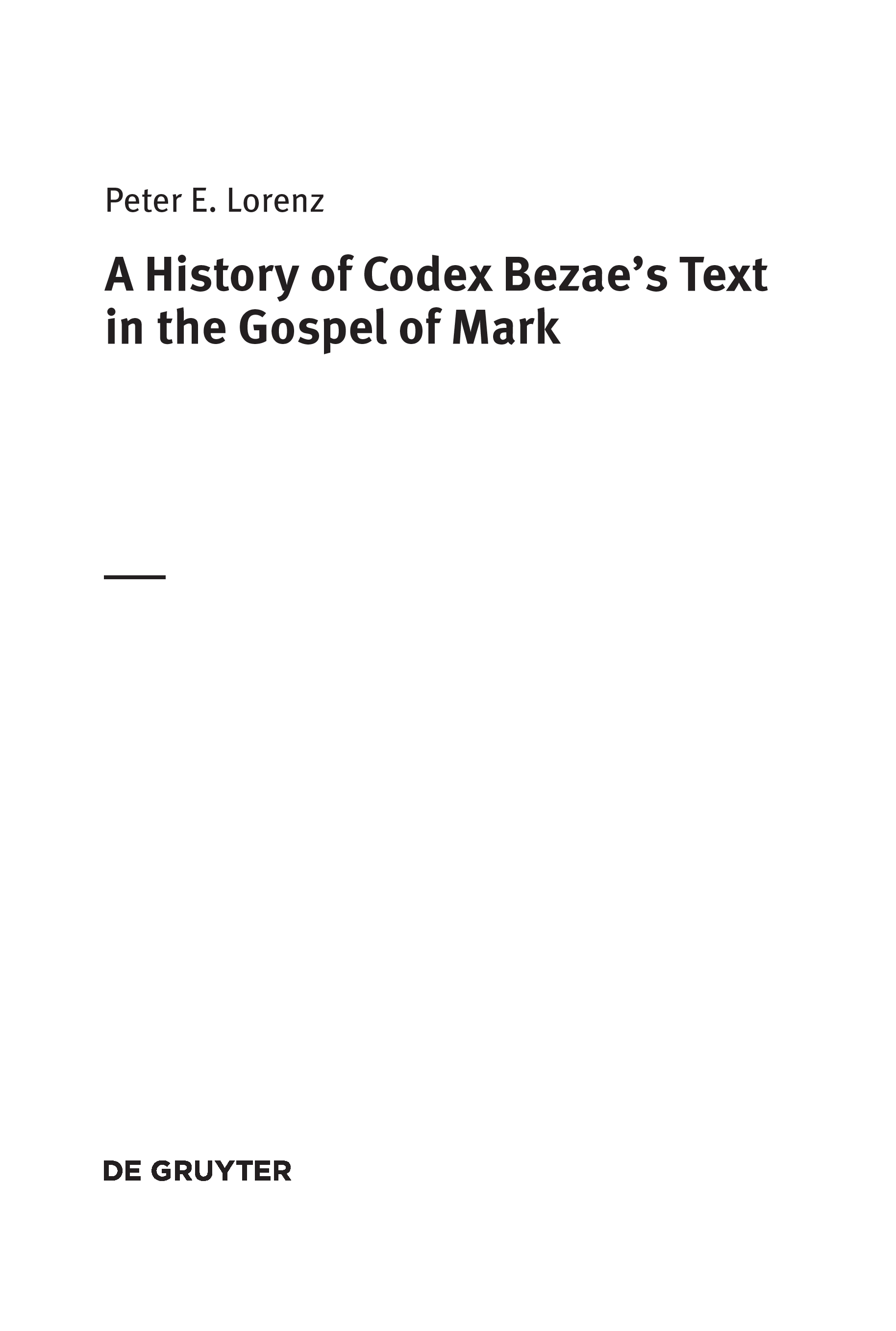
ISBN 978-3-11-074605-1
e-ISBN (PDF) 978-3-11-074686-0
e-ISBN (EPUB) 978-3-11-074693-8
ISSN 0570-5509
Library of Congress Control Number: 2021947720
Bibliographic information published by the Deutsche Nationalbibliothek
The Deutsche Nationalbibliothek lists this publication in the Deutsche Nationalbibliografie; detailed bibliographic data are available on the Internet at http://dnb.dnb.de.
2022 Walter de Gruyter GmbH, Berlin/Boston
www.degruyter.com

To Karen and Rachel, Hannah, Naomi, and Esther
Preface
The present study began with a deep curiosity regarding the so-called Western text of the gospels and Acts. Due to concerns though about the rather ill-defined quality of such a topic untethered to a particular artifact, I settled eventually on a somewhat narrower investigation of the text of Codex Bezae in the gospel of Mark, whose Greek tradition had recently been collated in preparation for the Editio Critica Maior of Mark and whose Latin tradition was then being published in installments by Professor J.-C. Haelewyck for the Vetus Latina edition of Mark. Given that it was Bezaes puzzling text, after all, which prompted the whole theory of a Western text back in the eighteenth century and that its text remains to this day the most often cited concrete representative of this theory, my curiosity has been amply rewarded despite the more limited topic.
Early on in my investigations into the Western text, I was troubled by a certain dissonance between the confidence and near unanimity with which the theory was espoused as a basic fact of textual history and the ambiguity of the evidence that such a text ever really existed in the form implied in the literature, whether as a great recension, a popular prevailing form of text, a pool of ancient readings, or a general trajectory of the Greek tradition. The texts most often cited in Justin Martyr and the anti-Marcionite heresiologists prove unsatisfactory for a variety of reasons, while the few sparse parallels with Irenaeus in Acts present a different set of problems. At one point, I pursued the possibility of a Syriac solution only to be disappointed by the lack of substantive parallels, issues of timing, and the problem of inferring Greek readings through the translation event. These problems are summarized in of the fifth-century context in which it was produced. The results of this investigation are presented below in the main study.
To the reader or reviewer who is unable to read the entire work chapter by chapter, I would suggest starting with the research questions, method, and survey in the introduction. The chapter summaries supply additional detail not covered in the survey, while the conclusion in , provides an overview of the full argument.
Acknowledgments
I would like to acknowledge the generous support of the Fulbright U.S. Student Program in covering the first year of my two-year research sabbatical in Germany at the Institut fr neutestamentliche Textforschung (INTF) at the University of Mnster. In addition, I would like to acknowledge the generous support of the Studienstiftung des deutschen Volkes in allowing me to continue my research sabbatical for a second year in Germany. Without the generosity of these institutions and their belief in the relevance of my work as a contribution to the study of ancient religious texts and to human knowledge in general, it would not have been possible for me to complete the present book.
I would like to acknowledge Prof. David C. Parker, Professor of Digital Philology at the University of Birmingham, Birmingham, UK, for his suggestion of the topic of this study.
I would like to acknowledge Dr. Bruce Morrill for his initial introductions to the colleagues who would later make this study possible. I would like to acknowledge my colleagues at the Institut fr neutestamentliche Textforschung, Mnster, Germany, in particular, Dr. Klaus Wachtel, Dr. Georg Gbel, Dr. Troy Griffitts, and Volker Krger, for their encouragement, feedback, and assistance in gathering the necessary data. I would like to thank Prof. Ulrich B. Schmid for encouraging me to perform this research in Germany. In addition, I would like to thank the many collators whose work in transcribing the gospel of Mark made this work possible.
I would like to thank the faculty, the committee, and the dean of the school of evangelical theology at Westflische Wilhelms-Universitt Mnster for the opportunity to submit and defend the dissertation that ultimately became this book for the degree of Doctor of Philosophy. I would like to thank Prof. Eve-Marie Becker for reading and commenting on my dissertation.
I would like to acknowledge my gratitude to my Doktorvater, Prof. Holger Strutwolf, Professor of Theology at the University of Mnster, Germany, and Director of the Institut fr neutestamentliche Textforschung in Mnster, Germany, who supervised my dissertation, accepted me as his doctoral student, arranged for my research visa, hosted me at the Institute, supported me in accommodating my familys stay in Germany and our return to the USA, prepared recommendations for my two research grants, guided me in my research, read and commented on the first drafts, inspired me with his warmth, wisdom, and breadth of knowledge of early church history and New Testament textual studies, and supplied me with a model of excellence in scholarship and service to the church. Without his kindness and generosity, I could not have completed the present study of Codex Bezae and its place in the history of the church.
I would like to thank the editors of Arbeiten zur Neutestamentlichen Textforschung, Prof. David C. Parker and Prof. Holger Strutwolf, for accepting this book for publication in the series and Dr. Albrecht Dhnert for arranging for its publication. I would like to thank Alice Meroz and Charlotte Webster for their kind assistance in preparing the manuscript for production.
I would like to acknowledge my parents for introducing me to the Christian faith at a young age. I would like to acknowledge my father, Prof. Edward C. Lorenz, for instilling in me a love for history, and my mother, Marilyn J. Lorenz, for inspiring me with a love of language. Their support has been a steady source of encouragement throughout this project.



